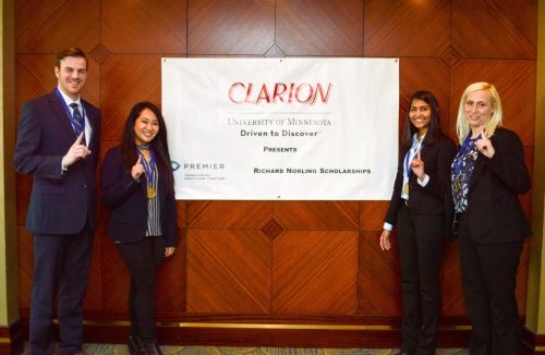Student Competitors Get Set for National Clarion Case
Story text

Interprofessional is more than a buzz word in health care — it is the way of the future. And, for some University of Illinois Chicago students, participating in a case study competition is an excellent way to practice interdisciplinary skills.
Recently, 12 UIC students participated in an individual case competition to prepare for the national Clarion Case Completion planned for spring 2021. Clarion is the nation’s only interprofessional case competition and is hosted by the University of Minnesota. UIC’s individual competition serves as a gateway to the team that will compete nationally.
The competition was open to all full-time UIC students in academic programs within UIC’s seven health sciences colleges. Students from UIC’s pharmacy, medicine, public health, and nursing programs competed.
“We had a good diversity of background and perspectives. Students were coming in from medicine, nursing, pharmacy, healthcare administration, and public health, and with multidisciplinary skills beyond their degree programs. Everyone benefits from bringing all the professional perspectives to share,” said Frank Borgers, associate program director of the Master of Healthcare Administration Program in the School of Public Health. He is also the head coach of the UIC Clarion Case team.
Competitors were given a case, “A Great Difference — Racial Disparities in Infant and Maternal Mortality and Morbidity.” The case involved a working mother of two whose high blood pressure goes untreated during her pregnancy, which eventually leads to premature delivery, the mother’s stroke, and the infant’s death after four days.
Teams had to analyze the case using root cause methodology and incorporate their own research into a four-slide PowerPoint presentation of five minutes or less. The presentation had to address the issues in the case and arrive at a set of recommendations to address them. Judges assessed the students on their analytical and strategic thinking skills, their ability to identify and prepare information, understanding and analysis of complex problems, ability to draw meaningful conclusions and strategically prioritize conclusions. Additionally, they were judged on their presentation skills and ability to deliver their message under pressure and in public.
“The presentations were across the board excellent, with several completely off the charts. The depth of talent, and the dedication to, and passion for public health and confronting systemic racism in our healthcare systems really took my breath away,” said Borgers.
Among those outstanding participants was Doctor of Nursing Practice student Tosha Donnals who took a five-minute break from her work on a COVID ICU unit in Urbana to deliver her presentation.
Samantha Yang is a Master of Health Administration candidate and president of the UIC chapter of the Institute for Healthcare Improvement Open School Chapter at UIC. She was on last year’s Clarion Case national team (canceled due to COVID-19 restrictions), and this year she will assist UIC students who compete nationally. She said case competitions offer a different taste of the world beyond the student experience.
“We have worked to navigate how we can mix the real world with student life,” Yang said. “It’s important to make sure that all the students that were participating felt like they were empowered and able to juggle things, but also that they were learning new skills to help smooth the transition to the real world.”
To prepare for the national competition in April, Borgers and co-coach Michele McCay, a UIC public health lecturer, will create teams and conduct another competition in the new year to select the four students who will go on to the national Clarion Case in mid-April. The case topic is “Natural Disasters, Migration, and Family Wellbeing.”
UIC competitors will have big shoes to fill: In the 2019 competition, UIC’s first, they won.
Beyond the competition, Borgers said the goal is to create a self-sustaining, student-led organization that can carry the Clarion effort forward. Yang encourages all students in healthcare to consider becoming involved.
“What’s misleading about the case competitions is that people think you have to have experience to do it,” Yang said. “The beauty of case competitions is you don’t have to know anything walking into it. You just need to be willing to dedicate time and have an open mind. Those are two of the most powerful tools because you’ll be able to be a sponge — to observe, listen and retain information. You’ll be able to deliver a fresh preceptive within your team.”
For more information on the UIC IHI Open School Chapter, email uicihichapter@gmail.com.